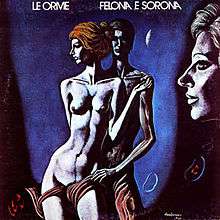Felona e Sorona
| Felona e Sorona | ||||
|---|---|---|---|---|
 | ||||
| Studio album by Le Orme | ||||
| Released | 1973 | |||
| Recorded | 1973 | |||
| Genre | Progressive rock, Italian Progressive Rock | |||
| Length | 33:39 | |||
| Label | Philips Records | |||
| Producer | Gian Piero Reverberi | |||
| Le Orme chronology | ||||
| ||||
| Professional ratings | |
|---|---|
| Review scores | |
| Source | Rating |
| Allmusic | |
Felona e Sorona is an album by the Italian progressive rock band Le Orme. It was released in 1973.
Named one of the "finest examples of Italian progressive rock",[2] it is a concept album pivoting on the story of two planets which revolve one around the other, without ever coming in contact. While Felona is shiny and flourishing, Sorona is dark and home to plagues and catastrophes: however, in the second part of the suite, the fate of the two planets is inverted.
Apart from two acoustic interludes, the music is mainly keyboard- and synth-driven, producing gloomy and spacey effects, especially in the opening "Sospesi nell'incredibile" and in the instrumental ending piece, "Ritorno al nulla" ("Return to Naught").
A version with English lyrics written by Peter Hammill of Van der Graaf Generator was issued in the U.K. by Charisma Records in 1974. The English title is Felona and Sorona.
Track listing
All tracks by Le Orme
The titles of the English version are shown between brackets.
- Side 1
- "Sospesi nell'incredibile" ("In between") – 8:43
- "Felona" – 1:58
- "La solitudine di chi protegge il mondo" ("The loneliness of those who protect the world") – 1:57
- "L'equilibrio" ("The Balance") – 3:47
- Side 2
- "Sorona" – 2:28
- "Attesa inerte" – 3:25
- "Ritratto di un mattino" ("Portrait of a morning") – 3:29
- "All'infuori del tempo" – 4:08
- "Ritorno al nulla" ("Return to Naught") – 3:34
Personnel
- Tony Pagliuca – keyboards
- Aldo Tagliapietra – voice, bass, guitars
- Michi Dei Rossi – drums, percussions
Notes
- ↑ Allmusic review
- ↑ Snider, Charles (2007). The Strawberry Bricks Guide to Progressive Rock. Chicago, IL: Strawberry Bricks. pp. 146–147. ISBN 978-0-615-17566-9.